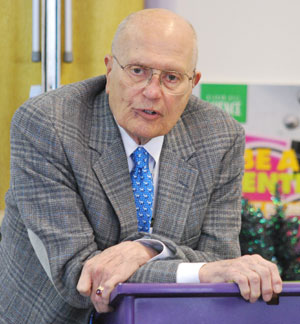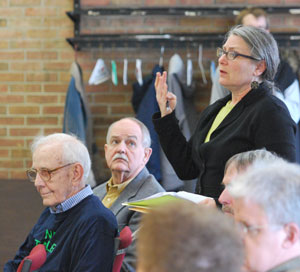Dingell Fields Questions on Health Care

John Dingell, the longest-serving member of the U.S. House of Representatives, spoke at the Saturday morning meeting of the Ann Arbor Democratic Party. Dingell represents the 15th District, which includes Ann Arbor. (Photos by the writer.)
U.S. Rep. John Dingell got his biggest round of applause at Saturday morning’s meeting of the Ann Arbor Democratic Party when he described his preference for health care reform as a single-payer system – a proposal he’s been pushing for decades.
But during much of the 45 minutes spent talking and fielding questions, Dingell described a compromise working its way through Congress that falls far short of that goal.
Dingell is the lead sponsor on the House of Representatives health care reform bill, which differs in substantive ways from the Senate’s version. Those two versions of the legislation will need to be reconciled over the coming weeks.
President Barack Obama is urging Congress to deliver something for him to sign before he makes the annual State of the Union address, Dingell said, adding that it’s not clear if that deadline will be met.
Dingell covered much of the same ground on Saturday as he did when The Chronicle last encountered him at a meeting of the Obama Caucus of Ann Arbor in August. But by now, the massive health care reform legislation is closer to completion – though it’s not, Dingell reminded his fellow Democrats, a done deal.
Legislation “We Can Be Proud Of”
Dingell told the group of about three dozen Democrats, meeting at the Ann Arbor Community Center on North Main, that Congress was on the road to wrapping up health care legislation “which I hope we can be proud of.” While the final version will likely provide coverage for an additional 30 million Americans who are now uninsured, it won’t go as far as Dingell would have liked. “Is it enough? The answer is no, it is not enough,” he said.

Ned Staebler, who's running for state representative in District 53, shoots video of John Dingell at Saturday's meeting of the Ann Arbor Democratic Party. Another candidate for the state District 53 spot – Jeff Irwin, a current county commissioner – also attended the meeting.
Dingell laid much of the blame for that on his colleagues in the Senate, saying he’s had a “structural dislike” for the Senate – ever since he saw as a boy the many ways that senators could delay action. And since then, he said, “they’ve only gotten better at it.” [Dingell's father, John Dingell Sr., was first elected to the House in 1932. Dingell himself has served since 1955, the year his father died.]
During his talk, Dingell touched on some of the major differences between the House and Senate versions. [Copies of an Associated Press article, published by the Detroit Free Press and explaining the House and Senate versions, were passed out at Saturday's meeting.]
One of those differences is the public option – a government-run health care plan that’s part of the House bill, but not in the Senate version. At the August meeting Dingell attended, held at the Ann Arbor home of Judy Dooley (who was also at the Saturday gathering), he said he’d do everything he could to keep the public option component. On Saturday, he told the group not to give up on the public option, but that it would be a hard fight to keep it in the final bill. [Later in the day, news reports described the public option as "doomed."]
Another battle could be fought over the new insurance exchanges called for by both the House and Senate versions. These exchanges – a mechanism for consumers and small businesses to buy insurance from providers – would be run by the federal government in the House version, while the Senate would give that role to the states.
Dingell said he thinks House speaker Nancy Pelosi will stand firm on the House version, but he described the process of reconciling the two bills as a “game of legislative chicken.” It will probably involve “ping-ponging” the versions from the House back to the Senate and vice versa, he said, coupled with extensive discussions among Congressional leaders. This approach is more likely than hammering out an agreement in conference committee, Dingell said.
Dingell acknowledged the controversy over the fact that conference committee meetings for health care legislation haven’t been opened to the media, a move that recently prompted the head of C-SPAN, Brian Lamb, to write to House and Senate leaders in protest. [.pdf file of Lamb's letter]
In addition to his comments about health care reform, Dingell offered an opinion on the 2010 elections. They’ll be difficult, he said, but he urged the group not to buy the story that Democrats will lose control of the House and Senate. He suggested that the federal budget and jobs will be among the major campaign issues. While some of the federal economic stimulus efforts show signs of success in producing jobs, Dingell said he hopes Obama doesn’t make the same mistake that Franklin D. Roosevelt made in the 1930s when he pulled back on some of the New Deal initiatives too early.
In concluding his remarks, Dingell noted that his own legislative priorities include passing a food safety bill that would be the biggest overhaul of that industry since 1938, plus similar legislation to better regulate the prescription pharmacy and cosmetics industries.

Lou Glorie, vice chair for programs for the Ann Arbor Democratic Party, pressed Dingell on whether he would vote for the Senate version of the health care bill, if a compromise couldn't be reached. Sitting in front of her are Doug Kelley and Stu Dowty – officers of the Washtenaw County Democratic Party.
Questions for Dingell
Several people had questions for Dingell, focused primarily on the health care legislation.
Lou Glorie commended Dingell for his health care op-ed published by Yahoo! in November. She asked him to clarify his remarks on the “ping-ponging” process, and wanted to know if he’d be willing to vote for the current Senate version of the legislation.
Dingell said he was only speculating about the course of action that Pelosi would take in reconciling the two versions – he wouldn’t swear that this would be her approach, he said.
Describing the current state of the U.S. health care system as “intolerable,” Dingell said he wouldn’t commit to voting on anything at this point. He said at the end of the day, they’ll all have to decide if the legislation is good enough to move forward – but he’d be loathe to throw away the progress they’ve made, saying this was the most difficult undertaking he’d experienced in his career.
It’s not the bill he would have written, Dingell added. However, he wanted to wait and see what the final version would look like. “Let’s push the process as hard as we know how,” he said.
A woman who told Dingell she was a nurse by profession asked how long it would take before health care reforms were enacted. Her patients are dying – they didn’t have health insurance, and therefore didn’t get the screening tests necessary to diagnose diseases before they became life-threatening, she told Dingell. “I want as much as we can get, as soon as we can get it,” she said.
Dingell said that after legislation was passed, there’d be a period required to write the accompanying rules and regulations, plus put the financial component in place. The Senate version sets the year for enactment at 2014 – the House version is a year earlier. He hoped the final legislation stays closer to the 2013 timeframe, and that they can address some issues even earlier – like closing the Medicare Part D “donut hole,” or addressing the practice by some insurers of denying coverage because of pre-existing conditions.

Jeff Pearson's son, Henry, was identified as the youngest Democrat attending Saturday's meeting – and got a shout-out from Dingell.
In response to a question about new recommendations regarding mammogram screenings, Dingell said he was “thoroughly outraged” about it. [In November, the U.S. Preventative Services Task Force recommended that women wait until they reach the age of 50 to begin mammography screening. The advice has been controversial, with groups like the American Cancer Society speaking out against it. Some have suggested that the timing was politically motivated to coincide with the debate over health care reform.]
Dingell reported that he’d met with medical professionals from the University of Michigan Medical School on Friday, who told him they weren’t planning to follow the new proposed guidelines.
In a question unrelated to health care, Gus Teschke asked about financial regulatory reforms being proposed by Sen. Chris Dodd and Rep. Barney Frank, noting that their legislation doesn’t call for the break-up of big banks. Teschke asked what could be done to make that happen.
Dingell said he’d like to see the Glass–Steagall Act reinstated – it kept the industry honest. That legislation, passed in the 1930s in the wake of the banking crisis of the Great Depression, was repealed during the Clinton administration. Dingell recalled that Dodd was a strong advocate for the repeal, and said that Frank’s bill is much better than current law regulating the industry.
The meeting wrapped up at noon, though Dingell and his wife, Debbie Dingell, stayed to talk with people who attended, including Ann Arbor city councilmembers Sabra Briere and Tony Derezinski. Dingell also spent a few minutes chatting with The Chronicle – we are unable to break any news about whether the 83-year-old congressman will run for reelection. That announcement will come at the appropriate time and place, Dingell said [which wasn't Saturday at the Ann Arbor Community Center].





Mary Morgan is a terrific reporter. This story is the fullest,
most accurate report of a local political meeting that I recall.
Brava!
Congressman Dingell has not proposed anything that will lower health care costs, only find new funding methods. When I asked him last summer in Saline why he doesn’t support increasing the number of medical doctors in this country by opening up new medical schools, he replied that “That would take too long” Meanwhile we must import 1/4 of our doctors and still do not have enough. Plus, these are jobs that many Americans would like to do. There is a shortage of training, not applicants. Increasing the numbers of doctors will lead to more competition and lower costs. Plus, some medical students could be admitted under the condition that they practice for 5 or 10 years in either a rural area or in an inner city as a general practice doctor, not a specialist.
While Dingell says, “That would take too long” In 5 or 10 years we either will have many new doctors, or not. Dingell chooses “not”
Editor’s note: The content of this comment has been deleted, because it was an article from CNN pasted in its entirety into the comment submission field. Please don’t do that.
For commenters who’d like to point Chronicle readers to other material on the world wide web that could be relevant to a Chronicle article, we’d prefer to see some explanation of why they think the other material is useful, followed by a link to the material.